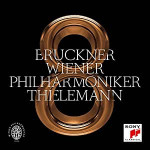|
Back
09/26/2020
Anton Bruckner: Symphony n° 8 in C minor, WAB 108
Vienna Philharmonic Orchestra, Christian Thielemann (conductor)
Recording: Musikverein, Golden Hall, Vienna (October 5 and 13, 2019) – 81’
Sony Classical # 19439786582 – Booklet in German and English

   
Christian Thielemann has recorded a handful of Bruckner symphonies with his own orchestra, the Staatskapelle Dresden, for the Profil label, which I assumed was planning a complete Bruckner cycle with those forces. Yet now Sony has announced a full cycle featuring the Vienna Philharmonic under Thielemann, which will be (one may be surprised to learn) the first such cycle from that preeminent Bruckner orchestra under a single conductor. Perhaps that justifies bringing Thielemann from Dresden to Vienna, if only from a marketing perspective; but in any case the conductor clearly enjoys a good rapport with both ensembles.
Sony is releasing its cycle piecemeal, beginning with the Eighth—one of the symphonies Thielemann has already recorded for Profil. How do the two versions compare? Certainly there’s not much between the two magnificent orchestras, each of which has a claim to be the ideal Bruckner ensemble. Characteristically, the Austrian strings play with a bit more brilliance and color, whereas the Germans have a slightly richer sound with a very robust low end. As far as interpretation goes, in Dresden Thielemann imposed a subito pianissimo in the recurring main theme of the “Scherzo” that has disappeared in the new Vienna account, but substantially the two readings are carbon copies. If you already own the Profil set, you needn’t rush to hear the Sony, unless you are particularly enamored of Thielemann’s approach to the work (or simply prefer the Vienna sound). That approach is at once patient and alert, with moderate tempos and consistently thoughtful, musical phrasing, never perfunctory or labored.
Thielemann’s is basically a gentle view of the score. He molds phrases with delicacy and refinement, and as exciting as the great climaxes are, one never has the sense that things are out of control. This is not purely a benefit, in my view; confronting the score’s darkness and anxiety more directly can make for a more exhilarating sense of triumph and catharsis at the end. Thielemann tends to bring out the lyrical beauty of Bruckner’s writing at the expense of the anguish underneath it, especially in the unsettled—and unsettling—first movement. Yet the reading flows both naturally and firmly, which is no small feat, and so I prefer Thielemann to conductors (such as Klaus Tennstedt and Eugen Jochum, in at least some of their various recordings) who sacrifice refinement for visceral excitement. Yes, Virginia, you can eat your cake and have it too—listen to the Staatskapelle Dresden under Bernard Haitink, or either of Karajan’s two recordings for Deutsche Grammophon, for overwhelming intensity married to patience and musical warmth. But on its own terms, this new Thielemann entry is enjoyable and even impressive, and if the whole cycle is this good, it will be, I think, a considerable if not quite earth-shattering achievement. I look forward to hearing the rest, particularly the Second and the Sixth, two works likely to respond especially well to Thielemann’s genteel but lively style.
Samuel Wigutow
|